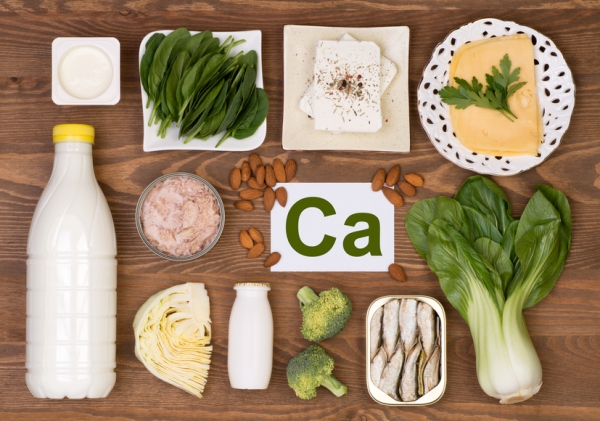Too much of a good thing? Calcium supplements may be bad for heart health

Calcium’s heart protective benefits are well documented and as expected the paper, part of the US Multi‐Ethnic Study of Atherosclerosis, found that high total calcium intake was linked with a lower risk of clogged arteries over the long‐term follow‐up.
The researchers found those with the highest total calcium intake (1453 mg or more) compared to the lowest intake (less than 434 mg) was associated with a 27% lower risk of CAC.
However the research published in the Journal of the American Heart Association (JAHA) found this positive effect was particularly evident if the high intakes were achieved without supplement use and concluded that use of calcium supplements may actually increase the risk for incident CAC and therefore jeopardise heart health.
In fact when considering supplement use, the risk of developing CAC was 22% higher in those who used calcium supplements compared to those who didn’t.
These conclusions were based on the study of 5,448 adults free of clinically diagnosed cardiovascular disease aged between 45 and 84.
The research came in response to recent data suggesting calcium supplements may increase the risk of cardiovascular disease events.
Over compensating
“Excessive dietary calcium intake, particularly from overconsumption of calcium supplements taken to prevent or treat osteoporosis, may have unintended health consequences. The well‐known ‘milk’‐alkali syndrome has been increasing in incidence attributed to the widespread use of over‐the‐counter calcium supplements,” the researchers wrote.
“Supplements contribute to calcium loading (ie, excessive calcium amounts in a single dose or bolus), which leads to an increase in urinary calcium excretion in adults with normal renal function, with or without hypercalcemia, and possibly to soft tissue or ectopic calcification.”
A 2014 study in the US found that 9% of women taking calcium supplements showed evidence of hypercalcemia and 31% had hypercalcuria.
The US researchers behind this latest cohort paper sought to address this “controversial” question using CAC – highly common in patients with coronary heart disease – as a marker of heart health.
“[W]e found evidence that calcium supplement use was independently associated with incident CAC, whether or not we adjusted for total calcium intake,” concluded the researchers from the University of North Carolina, University of Washington, Indiana University, Wake Forest School of Medicine, Emory University, the Washington Patient‐Centered Outcomes Research Institute, the Los Angeles Biomedical Research Institute at Harbor‐UCLA Medical Centre and Johns Hopkins University in the US.
“This finding suggests that calcium loading with supplements may not be entirely free of undesirable side effects, especially considering evidence for events in randomised trials of calcium supplementation like the Women's Health Initiative.”
How much is too much?
Yet looking closely at the levels consumed via the supplements, the British Nutrition Foundation (BNF) urged caution.
“The recommended intake for calcium is higher in the US than the UK,” science director for the charity, Sara Stanner, told us.
Market scan
Holland & Barrett’s own brand calcium supplement contains a daily dose of 1,000 mg, which it marks as 125% of the UK’s daily recommendation. Other third party calcium supplements on the popular UK retailer’s website contain at least 800 mg per adult daily dose.
“Here [in the UK] the RNI [Reference Nutrient Intake] is 700 mg/day for 19-50 year olds. So the groups with the highest intakes were consuming supplements with doses much higher than the recommended amount.”
In the US its Institute of Medicine recommends calcium intakes of 1,200 mg/day for women and 1,000 mg/day for men aged 51 years and older.
Yet the highest quintile of calcium intake in the study was nearly double this at 2,157 mg per day.
Last year the European Food Safety Authority (EFSA) set various Population Reference Intakes (PRIs) for different age groups including 950 mg per day for adults over the age of 25.
Meanwhile the British Heart Foundation (BHF) urged those prescribed calcium for bone conditions such as osteoporosis not to stop taking the medication and to contact their doctor if they have any concerns.
Senior dietitian for the heart charity, Tracy Parker, told us: “This study shows a protective relationship between our total calcium intake and coronary heart disease, caused by a build-up of fatty material inside your arteries which could lead to a heart attack.
“However, this research only found an association between people who used calcium supplements and risk of coronary heart disease; this does not mean that calcium supplements could directly increase your risk of heart disease."
She added: “Following a balanced diet should provide all the calcium the body needs to keep healthy."
Source: Journal of the American Heart Association
doi: 10.1161/JAHA.116.003815
“Calcium Intake From Diet and Supplements and the Risk of Coronary Artery Calcification and its Progression Among Older Adults: 10‐Year Follow‐up of the Multi‐Ethnic Study of Atherosclerosis (MESA)”
Authors: J.J.B. Anderson, B. Kruszka, J.A.C. Delaney, K. He, G. L. Burke, A. Alonso, D. E. Bild, M. Budoff and E. D. Michos


















